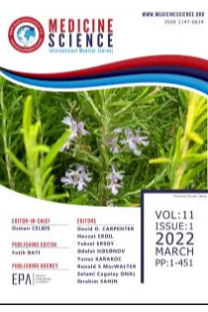Evaluation of the relationship between COVID-19 and hyperglycemia
Evaluation of the relationship between COVID-19 and hyperglycemia
___
- 1. Lui DTW, Lee CH, Chow WS, et al. A territory-wide study on the impact of COVID-19 on diabetes-related acute care. J Diabetes Investig. 2020;11:1303-6.
- 2. Saeedi P, Petersohn I, Salpea P, et al. Global and regional diabetes prevalence estimates for 2019 and projections for 2030 and 2045: Results from the International Diabetes Federation Diabetes Atlas, 9th edition. Diabetes Res Clin Pract. 2019;157:107843.
- 3. Zhu N, Zhang D, Wang W, et al. ChinaNovel Coronavirus Investigating and Research Team A novel coronavirus from patients withpneumonia in China, 2019. N Engl J Med. 2020;382:727–33.
- 4. Li H, Liu SM, Yu XH, et al. Coronavirus disease 2019 (CO VID-19): current statusand future perspectives. Int J Antimicrob Agents. 2020;55:105951.
- 5. Guo W, Li M, Dong Y, et al. Diabetes is a risk factor for the progression and prognosis of COVID-19. Diabetes Metab Res Rev. 2020;e3319.
- 6. Guan WJ, Ni ZY, Hu Y, et al. Clinical Characteristics of coronavirus disease 2019 in china. N Engl J Med. 2020;382:1708‐20.
- 7. Izumi Y, Hidaka Y, Tada H, et al. Simple and practical parameters for differentiation between destruction-induced thyrotoxicosis and Graves’ thyrotoxicosis. Clin Endocrinol (Oxf). 2002;57:51-8.
- 8. Umpierrez GE, Hellman R, Korytkowski MT, el al. Management of hyperglycemia in hospitalized patients in non-critical care setting: An Endocrine Society clinical practice guideline. J Clin Endocrinol Metabol. 2012;97:16–38.
- 9. Singh AK, Gupta R, Misra A. Comorbidities in COVID-19: outcomes in hypertensive cohort andcontroversies with renin angiotensin system blockers. Diabetes Metabol Syndrome Res Rev. 2020;14:283-7.
- 10. Yang J, Zheng Y, Gou X, et al. Prevalence of comorbidities in the novel Wuhan coronavirus (COVID-19) infection: a systematic review and metaanalysis. Int J Infect Dis. 2020 Mar 12 doi: 10.1016/j.ijid.2020.03.017. pii: S1201-9712(20)30136-3.
- 11. Epidemiology Working Group for Ncip Epidemic Response The epidemiological characteristics ofan outbreak of 2019 novel coronavirus diseases (COVID-19) in China. Chin J Epidemiol. 2020;41:145–51.
- 12. Preliminary estimates of the prevalence of selected underlying health conditions among patientswith coronavirus disease 2019 — United States, february 12–march 28, 2020.CDC COVID-19response team. 13. Yang JK, Lin SS, Ji XJ, Guo LM. Binding of SARS coronavirus to its receptor damages isletsand causes acute diabetes. Acta Diabetol. 2010;47.
- 14. Cheng H, Wang Y, Wang G‐Q. Organ‐protective effect of angiotensinconverting enzyme 2 and itseffect on the prognosis of COVID‐19. J Med Virol. 2020;92:726-30.
- 15. Kristan MM, Kim YK, Nelson T, et al. Predictors of severe COVID-19 disease in patients with diabetes: a multi-center review. Endocr Pract. 2021;27:842-9.
- 16. Haymana C, Demirci I, Tasci I, et al. Clinical outcomes of non-diabetic COVID-19 patients with different blood glucose levels: a nationwide Turkish study (TurCoGlycemia). Endocrine. 2021;73:261-9.
- 17. Zhang Y, Li H, Zhang J, et al. The clinical characteristics and outcomes of patients with diabetes and secondary hyperglycaemia with coronavirus disease 2019: A single-centre, retrospective, observational study in Wuhan. Diabetes Obes Metab. 2020;22:1443-54.
- 18. Saand AR, Flores M, Kewan T, et al. Does inpatient hyperglycemia predict a worse outcome in COVID‐19 intensive care unit patients?. J Diabetes. 2021;13:253-60.
- 19. Yang JK, Lin SS, Ji XJ, Guo LM. Binding of SARS coronavirus to its receptor damages isletsand causes acute diabetes. Acta Diabetol. 2010;47:193–9.
- ISSN: 2147-0634
- Yayın Aralığı: 4
- Başlangıç: 2012
- Yayıncı: Effect Publishing Agency ( EPA )
Ozan Ali ERDAL, Barış GÖRGÜN, İlker Abdullah SARIKAYA, Ali ŞEKER, Mustafa İNCESU, Muharrem İNAN
Alisan Burak YAŞAR, Yunus HACIMUSALAR, Aybeniz Civan KAHVE, Mehmet Sinan AYDIN
Clinical results of endoprosthetic reconstructions in metastatic and primary bone tumors
Ahmet ADIGÜZEL, Yahya AKALIN, Sibel ÇIPLAK
Mustafa TİMURKAN, Esra SUAY TİMURKAYA, Yılmaz ASLAN, Mehmet KALAYCI, Hakan AYYILDIZ
Kübra ÖZKÖK KANGAL, Taylan ZAMAN, Cesur ÜSTÜNEL
Evaluation of the relationship between COVID-19 and hyperglycemia
Seval Müzeyyen ECİN, Deniz GEZER
A bioinformatic analysis of the spike glycoprotein & evolution of COVID-19
